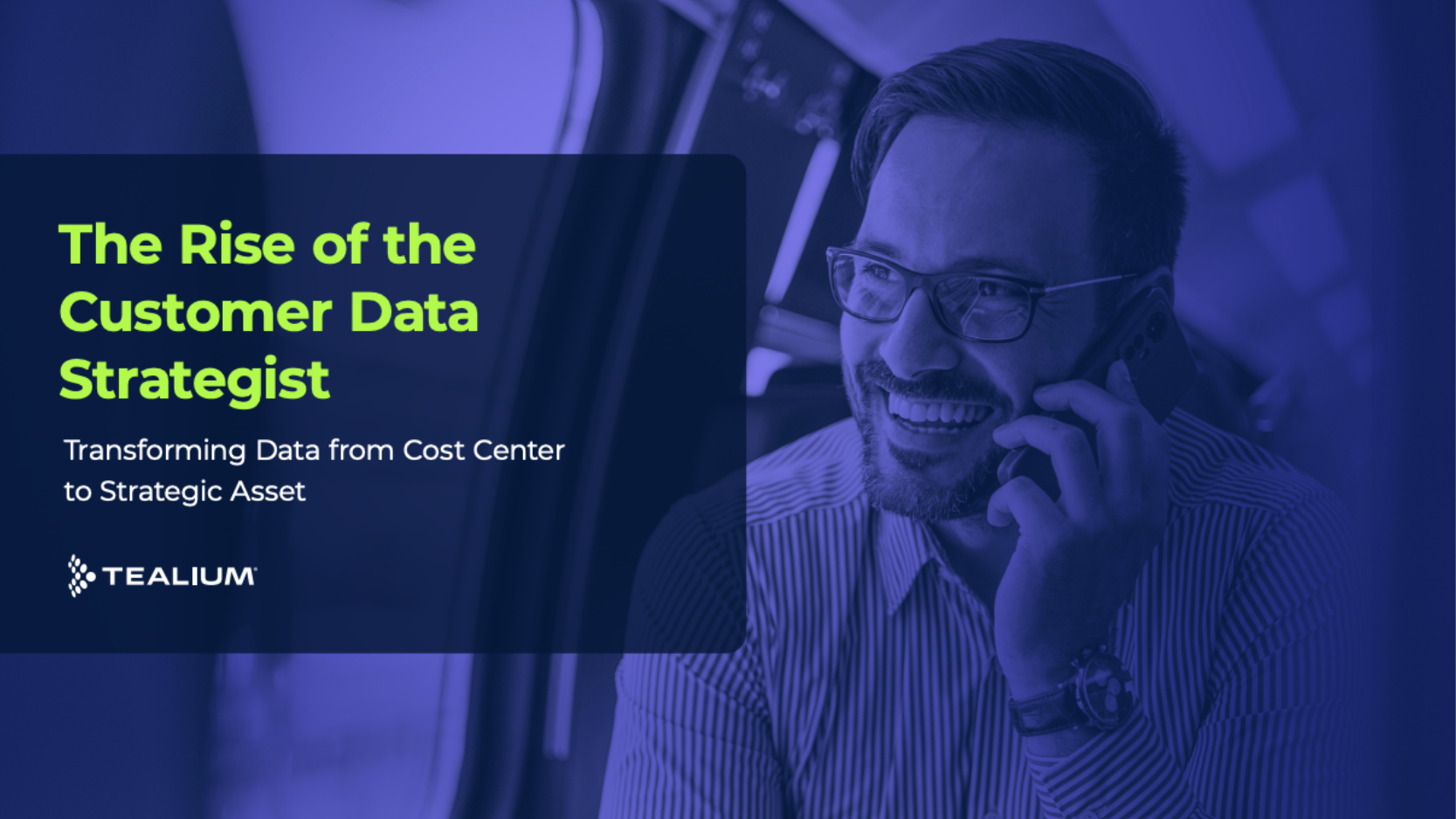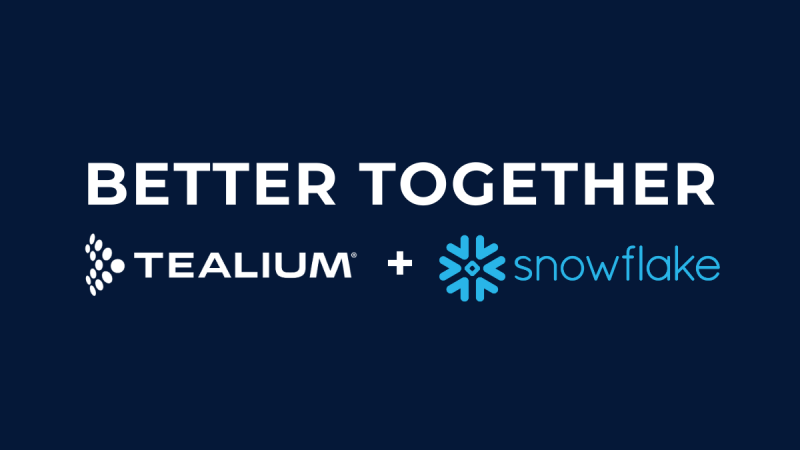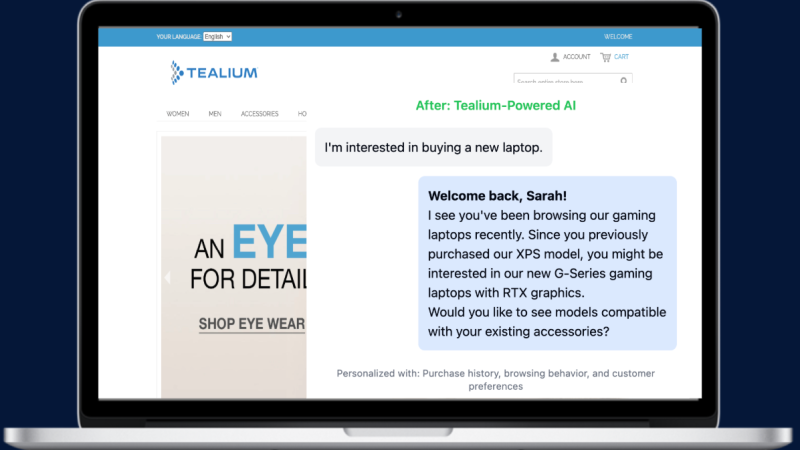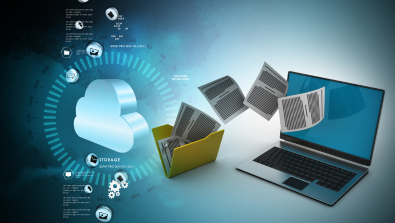A look at what’s next for a Customer Data Platform (CDP), key CDP trends to anticipate, and how to select the best CDP.
This year, we’ve seen tremendous growth within the Customer Data Platform (CDP) space (looking at you, 2024 Gartner® Magic Quadrant™ for Customer Data Platforms). It’s important to understand how we got here, and what it means for the future of the CDP space.
In our recent webinar, we sat down with Tealium’s co-founder and CTO, Mike Anderson, and Scott Brinker, Vice President of Platform Ecosystem at HubSpot and Editor at chiefmartec.com. Together, we discussed the evolution and future of CDPs. This blog acts as a recap of their discussion.
What Is A Customer Data Platform (CDP)?
Before we get started, let’s define what a Customer Data Platform (CDP) is. The CDP Institute defines a Customer Data Platform as “packaged software that creates a persistent, unified customer database that is accessible to other systems.” Essentially, a CDP is a pre-built system that centralizes customer data from all sources and then makes this data available to other systems for marketing campaigns, customer service, and all customer experience initiatives.
According to Scott and Mike, the benefit of a CDP is to connect your Marketing Technology (MarTech) system and deliver concierge-level customer experiences on a massive scale. In our recent webinar, they agreed, “If you’re gathering data but not feeding it into your larger marketing operations, you’re missing out on data.”
What Has (And Hasn’t) Changed With Customer Data Platforms (CDPs)?
While the Customer Data Platform (CDP) industry has greatly evolved over the years, some things remain the same.
First, let’s answer the question of what’s changed in the CDP world
- The Volume of Vendors: When Scott started evaluating CDPs and MarTech, there were a couple hundred businesses in the space. Today, there are many thousands! As Scott said, “It’s clear from the volume of vendors, that there is tremendous growth in the industry.”
- Barriers to Entry: In the early days of software, creating new products was incredibly expensive from a people and product perspective. As Scott said, “In comparison to that time, the barriers to entry are practically zero.” As the industry grew, matured, and became more commonplace, these expensive labor and tools became cheaper. As a result, companies can implement them more quickly and easily.
- Digital Experiences: It’s no secret that customer experience and personalization are shifting to an online world. When talking about the COVID era, Scott talked about digital transformation saying, “COVID was a catalyst for many companies to go digital. Either you’re going digital, or you aren’t going to be engaged in the market at all. It made companies accelerate their timeline to digital transformation.”
Now, let’s talk about what’s the same with CDPs
- The Need for Superior Customer Experiences (CX): A stellar customer experience never goes out of style. In this increasingly digital world (where competition gets fiercer by the day), you need to deliver personalized and relevant experience at each customer touchpoint, in real-time. The major advantage of real-time data processing is its ability to facilitate fast decision-making, helping your company serve up the most relevant experiences to customers. As Mike stated, “Customer experience is where every company needs to focus.”
- Marketers Need Data: As Mike said in the webinar, “There is so much opportunity to help marketers do a better job. The answer doesn’t always have to be ‘go to the engineering department’, but marketers can access more information than ever.” With Tealium, your marketers can side-step data silos, and get access to data that spans the entire business. It’s critical to work from accurate, consented data that is available across the organization.
- Clean, Consented Data: Artificial Intelligence (AI) is accelerating the need for clean data. As more companies use AI to fuel their projects, the results will be less than ideal without accurate data to fuel these models. So, having high-quality data has never been more important (see our product, Tealium for AI). However, clean data doesn’t just help AI– it helps support other areas of your business like personalization, reporting, and more.
- Getting The Edge: When it comes to getting an edge, Mike said it best when he stated, “I don’t need to beat my competitors, I just need to keep my customers happy… Because if I keep them happy, they’ll stay my customers.”
3 Key Trends to Anticipate for Customer Data Platforms (CDP)
Shifting Buyer Persona
As budgets tighten, software purchases are under more scrutiny. As a result, software that appears like a duplication, or is considered “nice to have, not a need to have” is often churned. When it comes to buying a CDP, look for one that reduces friction across the organization, delivers value, and gets implemented (and used) quickly.
As Mike mentioned, “Today’s CDP buyer is increasingly becoming an IT buyer. They are playing a bigger role, and are coming at it from a performance and scalability side.” But, why does IT have a bigger hand in the purchase of a CDP? We think there are multiple factors, but the most prevalent seems to be data governance. Your IT department should be thinking of privacy-by-design data management programs to process customer data transparently and follow new regulations and industry best practices. With Tealium iQ, you can get precise control over the data and the practices surrounding your vendors.
Preference for Buying Over Building
Within the realm of CDPs, the concept of the composable CDP has garnered considerable interest. A composable CDP is characterized by its “build it yourself” approach, leveraging a component-based modular architecture to offer enhanced flexibility and customization. However, the practical implementation of composable CDPs often poses challenges and can do more harm than good.
Using a composable approach has risks with complexity, scalability, maintenance, compliance, and cost. Organizations are becoming disillusioned with the composable CDP, and are turning to a packaged approach to get the most out of their CDP investment.
Here’s why a packaged is a better bet than a composable CDP
- Ease of Implementation: Tealium provides over 1,300 turnkey solutions, offering flexibility and control, and making it quicker and easier to implement (in comparison to building a CDP from scratch). Our integrations allow you to flex as your business grows, optimizing the tools you already rely on (or might adopt in the future) to drive better CX.
- Support and Maintenance: We provide ongoing support and maintenance, including hands-on training, software updates, security patches, and troubleshooting assistance. This support can reduce the burden on your internal IT team and ensure that your CDP remains secure and up-to-date.
- Expertise and Best Practices: Using a vendor trusted by the world’s leading brands offers you increased insight and expertise. As a Leader in the 2024 Gartner® Magic Quadrant™ for Customer Data Platforms, we feel like we know a thing or two! By leveraging our knowledge and experience, you can ensure that your CDP is configured and optimized for maximum effectiveness.
Businesses seeking a reliable, scalable, and efficient solution for managing customer data will likely find more success with a CDP like Tealium. Opting for a more integrated and streamlined CDP that prioritizes interoperability and simplicity will prove to be a wiser investment in the long run.
Artificial Intelligence (AI) Strategies
AI is becoming increasingly commonplace, and will likely have the same “accelerator” effects of transformation as the COVID-era. However, as businesses rush to adopt AI, they risk using bad data. Using bad data to fuel AI models can have disastrous outcomes and cost you customer trust! As Scott said, “Everyone is talking about AI strategy, but it really comes down to your data strategy.” Scott discussed how AI and ML are highly commoditized and are unlikely to be your differentiating factor… But what will be is the quality of the data that you can feed your AI models.
To get the best data, you’d benefit from a tool to assist you! We built Tealium for AI to help you get consented, filtered, enriched data in real-time for AI models and activate the results. Whether training data, data to feed the model, data for fine-tuning, or activating the results, Tealium connects your AI models to all your tools and customers.
In conclusion, The Evolution & Future of CDPs offered a lot of insightful content about the CDP landscape. For more tools at your disposal and to support your CDP future, we recommend you check out our Tealium products – Tealium for AI and Tealium iQ.
Gartner, Magic Quadrant for Customer Data, Lizzy Foo Kune, Rachel Smith, Benjamin Bloom, Suzanne White, Adriel Tel, David Walters, February 14, 2024.
GARTNER is a registered trademark and service mark of Gartner, Inc. and/or its affiliates in the U.S. and internationally, and MAGIC QUADRANT is a registered trademark of Gartner, Inc. and/or its affiliates and are used herein with permission. All rights reserved. Gartner does not endorse any vendor, product or service depicted in its research publications, and does not advise technology users to select only those vendors with the highest ratings or other designation. Gartner research publications consist of the opinions of Gartner’s research organization and should not be construed as statements of fact. Gartner disclaims all warranties, expressed or implied, with respect to this research, including any warranties of merchantability or fitness for a particular purpose.







